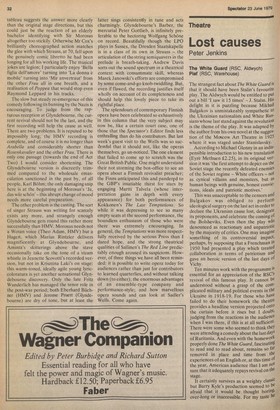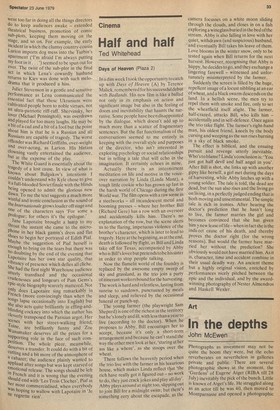Theatre
Lost causes
Peter Jenkins
The White Guard (RSC, Aldwych) Piaf (RSC, Warehouse) The strangest fact about The White Guard is that it should have been Stalin's favourite play. The Aldwych would be entitled to put out a bill 'I saw it 15 times' —J. Stalin. His delight in it is puzzling because Mikhail Bulgakov is unmistakeably sympathetic to the Ukrainian nationalists and White Russians whose last stand against the revolution is the theme of the play. It was adapted by the author from his own novel at the suggestion of the Moscow Art Theatre in 1925 where it was staged under Stanislavsky.
According to Michael Glenny in an indispensible introduction to his new translation (Eyre Methuen 12.25), in its original version it was 'the first attempt to depict on the Soviet stage the recently defeated enemies of the Soviet regime — White officers — not as cynical villains and monsters, but as human beings with genuine, honest convictions, ideals and patriotic motives.' This was unacceptable to the censors and Bulgakov was obliged to perform ideological surgery on the last act in order to declare the Ukranian cause lost, denigrate its proponents, and celebrate the coming of the Bolsheviks. Even then the play whs denounced as reactionary and unpatriotic by the majority of critics. One may imagine something of its controversial impact, perhaps, by supposing that a Frenchman ill 1950 had presented a play which treated collaboration in terms of patriotism and gave an heroic version of the last days of Vichy. Ten minutes work with the programme is essential for an appreciation of the RSC's revival of this famous play. It cannot be understood without a grasp of the complicated military and political events in the Ukraine in 1918-19. For those who have failed to do their homework the theatre provides a headline version projected onto the curtain before it rises but I doubt, judging from the reactions in the audience when I was there, if this is at all sufficient. There were some who seemed to think theY were attending a comedy about the last daYs of Ruritania. And even with the homework properly done The White Guard, fascinating to read and to read about, remains so far removed in place and time from the experiences of an English or, at this time Of the year, American audience that I am not sure that it adequately repays revival on the stage. It certainly survives as a weighty classic but Barry Kyle's production seemed to be afraid that it would be thought boring, over-long or inaccessible. For my taste he went too far in doing all the things directors do to keep audiences awake — extended theatrical business, promotion of comic sub-plots, keeping them moving on the stage, and so on. For example, the early incident in which the clumsy country-cousin Larion imports dog mess into the Turbin's apartment (`I'm afraid I'm always putting my foot in it. . . ') seemed to be spun out for ever. The twist of the sub-plot in the final act in which Lena's cowardly husband returns to Kiev was done with such melodrama that it produced a hiss.
Juliet Stevenson in a gentle and sensitive Performance as Lena communicated the essential fact that these Ukranians were cultivated people born to noble virtues, not an ultra-patriotic riff-raff. Shervinsky, her lover (Michael Pennington), was overdrawn and played for too many laughs. He may be a bit of a cad and a bit of a fool but the point about him is that he is a Russian and all Russians are capable of tragedy. The worst offender was Richard Griffiths, over-weight and over-acting, as Larion. His blatant e, 'owning vastly entertained the audience, out at the expense of the play. The White Guard is essentially about the tragedy of a lost cause. In view of what is known about Bulgakov's intentions I couldn't understand why Kyle chose to give it a full-blooded Soviet finale with the blinds being opened to admit the glorious new dawn. To me the text suggests a much more wistful and ironic conclusion as the sound of the Internationale grows louder off stage and one of the characters says 'For some a Prologue; for others it's the epilogue.' • Jane Lapotaire brought a lump to my throat the instant she came to the microPhone in her black gamin's dress and flat shoes to begin her portrayal of Edith Piaf. Maybe the suggestion of Piaf herself is enough to bring on the tears but there was no doubting by the end of the evening that Lapotaire has her own star quality, that Vibrancy of presence which defies all cliche. She had the first night Warehouse audience utterly transfixed and the occasional erudenesses and longeurs of Pam Gems's epic-style biography scarcely mattered. Not unlY does Lapotaire sing remarkably in French (more convincingly than when the songs lapse occasionally into English) but she also acts quite brilliantly in effing-andblinding cockney into which the author has cleverly transposed the Parisian argot. Her scenes with her street-walking friend, Toine, are brilliantly funny and Zoe Wanarnaker deserves all the prizes for a suPPorting role in the face of such cornPetition. The whole piece, meanwhile, deserves a transfer. It could do with a bit of cutting and a bit more of the atmosphere of a cabaret; the audience plainly wanted to applaud after songs but was kept starved of emotional release. The songs should be left In French and it is wrong that the evening should end with 'Les Trois Cloches', Piaf at her most commercialised, when everybody was hoping to wallow with Lapotaire in `Je ne regrette rien'.











































 Previous page
Previous page